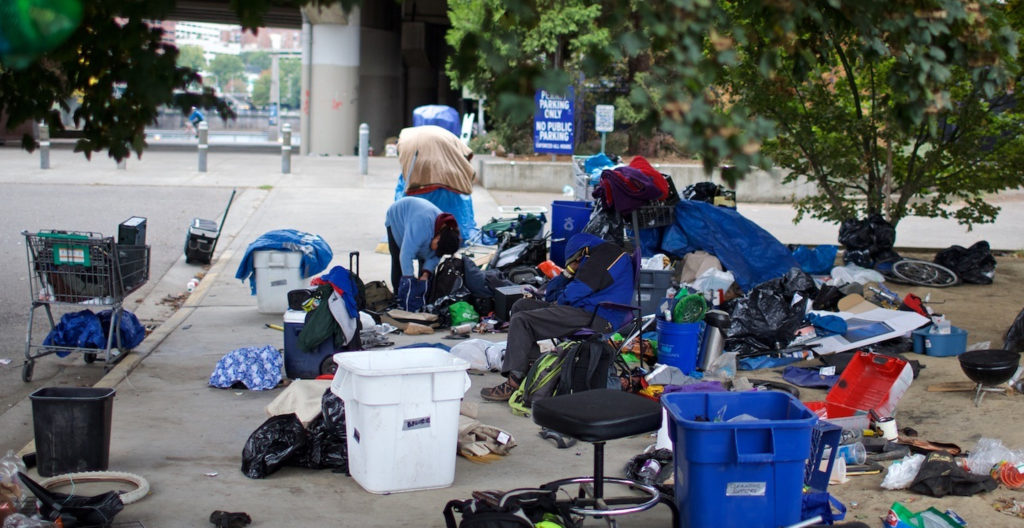
I’m Upset
Homelessness, a national crisis, is even more of a problem in Oregon. It is number four in the per capita number of people unhoused. The city reminds me more and more of a giant refugee camp similar those to ones across the border from Ukraine, only our camp is worse because there are no regulations, few facilities, and limited services. Environmental, sick, and poverty- driven local refugees are creating a pandemic to rival Covid.
The problems are complex, and government leaders are baffled as to how to proceed. Some people feel bad for the homeless, and blame the government while others fault the homeless for having made bad decisions. No matter your feelings, it is a difficult problem needing multiple solutions. We shouldn’t be forming factions that fight as we find our way forward.
Portland’s Safe Street Policy that legalizes homeless camping was just extended for three years, a decision many find intolerable. Taking a different approach, People for Portland (PfP), a community-based non-profit organization, is collecting signatures for a ballot measure to ban homelessness on city streets. When a city councilman recently suggested opening five, mega-shelters with services, homeless advocates were up in arms. They want funds directed to building low-income housing, not spent on shelters. Unfortunately, constructing apartments for the 16,000 people living in vehicles and tents will take years. With the number of unhoused people escalating at 14 percent annually, how can the city keep up? Scattering homes and safe villages around town that hold 60 residents is a band-aide for a bleeding wound that is spreading.
The city became unsightly almost overnight. Crime, graffiti, and drug use are at a record high. The mentally ill roam neighborhoods unmedicated. Instead of downtown a cultural center that lifts one’s spirit, it was filled with people no one wants to be around. Businesses and tourists are abandoning it in record numbers. I think of our downtown as a donut hole filled by well-meaning people who didn’t understand the consequences of letting street people take over the city.
Finding a solution involves compromise and a willingness to test a multitude of ideas including shelters in facilities like our expo center. When the idea was put forth, I was alarmed by how fast it was dismissed by homeless advocates. The proposal was to erect 1000 refugee-style tents inside a building that is heated and air-conditioned, containing bathrooms and food vendor areas. There’s plenty of outdoor space for RVs and for service organizations to set up clinics, classes, movies, and daycare. Located near light rail, access to the rest of the city is easy. One complaint was that a 1000 person center is too large. I wonder if these same people think 1,500 person high schools, senior centers, and community colleges are also too large.
Criticism was also directed against having the national guard provide security. But, why not? Wealthy people live in gated communities and pay for private security guards. Why shouldn’t our refugees sleep soundly at night and leave their tents without worrying they’ll be robbed?
Vibrant cities elevate citizens so they want to reach for the stars. They are inspirational cultural centers that attract tourists and tax money that supports the arts as well as those needing special assistance.
Unfortunately, well-meaning volunteers and social justice organizations, not just the government, let our city evolve to the point where ordinary citizens are afraid to walk on sidewalks and in the parks they support. Permitting vagrants to trash the environment is turning several Oregon cities into third-world communities.
A common first instinct is to say no rather than yes, let’s test the premise. People, in general, don’t like change. Yet, to solve the multitude of problems caused by a large unhoused population, we have to stop negating suggestions before they are tested. We are on the same path of seeking a compassionate solution that is acceptable to everyone in the city. We face a very big problem that calls on courage and thinking outside the box to bring our city back to life
States With The Largest Homeless Population Per Capita In The US
Please comment below.
My interest in homelessness goes back over forty years.
I attended many A Home for Everyone meetings, interviewed agencies serving the homeless, wrote numerous articles, gave talks, and authored a book about homeless youth. Before directing science centers, I trained as mental health therapist, counseling alcoholics, and drug addicts. My husband and I took in a boy who was unhoused for four years, learning a great deal by doing so. As president of OMSI and The Museum Tour Catalog, I made sure we reached people from every socio-economic sphere. I can be reached at marilynne@eichingerfineart.com

